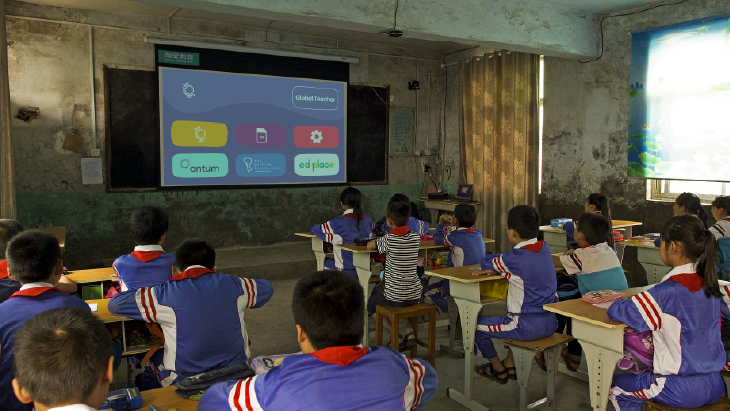Tech for good: how technology can tackle some of society’s biggest challenges
7 min read | James Hallahan | Article |

Did you know that two in three young people across the world don’t have access to the internet at home, and 50% of schools worldwide have no internet access? This digital divide has left many behind, as they’re unable to access learning resources and new information as easily as other learners.
Cue Sunderland-based tech startup, Global Teacher, and its offline learning kit. The 3D-printed projector, ‘Pod’, delivers learning resources to schools with no need for electricity or the internet. Solar energy, generated using a 50W solar panel, operates the Pod and keeps its battery charged for extended use, meaning a full day of internet-supported teaching can be delivered in the world’s poorest communities.
Global Teacher’s innovative approach to tackling educational inequality has led to its overall victory in the Super Connect for Good competition, an initiative run by Hays and Empact Ventures. The competition profiles startups and scale-ups that use technology to tackle pressing societal issues. It’s clear that the UK and Ireland are taking a leading role in the tech for good space, securing wins in seven out of the 10 categories.
Providing a scalable solution to the shortage of sign language interpreters and translators
Even if there were 100 times as many sign language interpreters and translators as there are today, we wouldn’t even begin to scratch the surface of the global shortage. There are 151,000 British Sign Language (BSL) users in the UK, but without sufficient interpreters and translators, these individuals are excluded from accessing the same content as others.
Robotica, the winner of the AI for Good category, uses artificial intelligence capabilities to break down barriers to information for deaf and partially hearing people. It provides a fully automated solution for translating speech from 20 different languages into signed languages, presented by a realistic human avatar.
Empowering people to maintain their independence in later life
When older adults are discharged from hospital, there’s often a sense of responsibility and anxiety for family members taking on care responsibilities. The person may also feel vulnerable in their own home and like they’ve lost their sense of independence.
MiiCare, a UK-based startup, aims to empower people to maintain their independence in later life through their AI-powered home care. The package includes home sensors, health devices, and a virtual assistant – bringing companionship to the person and providing health insights and peace of mind for their loved ones. MiiCare has overcome many challenges when designing products for its target age group, including privacy, dignity, affordability, and technophobia, and has been named the winner of the HealthTech category.
Reducing the risk of complications during caesarean births
A caesarean section (C-section) operation is the world’s most commonly performed surgery, accounting for 30 million births worldwide. It can be a lifesaving procedure for both mother and baby, but it also has the risk of haemorrhage and infection, like any other major operation.
NUA Surgical’s device facilitates access to the uterus and reduces the risk of surgical complications. The Irish startup won the MedTech category and has been recognised for making C-sections a safer procedure with its innovative offering.
Equipping public spaces with the tools to prevent and treat anaphylaxis
If someone is having a heart attack in a public place, chances are there’ll be a defibrillator nearby that can be used to significantly increase their chances of survival before an ambulance arrives. But what if somebody has a severe allergic reaction?
Kitt Medical’s mission is to ensure life-saving allergy medication can be accessed by anyone who needs it in an emergency. The startup won the General Tech for Good category and has already undergone successful pilots in schools across the UK, providing access to emergency treatment kits, anaphylaxis training, incident reporting, and medication tracking. The next goal is for the kits to be piloted in other public spaces, like offices and airports, and to become a next-door neighbour to defibrillators.
Reducing water consumption in commercial bathrooms
Toilets in the UK require an average of nine litres of water to fully flush – this is a huge waste of clean drinking water, and the water treatment process leaves a significant carbon footprint in its wake. In commercial buildings, toilets can account for up to 48% of water consumption.
Propelair, the winner of the Climate Tech category, aims to reduce water consumption in commercial spaces with an efficient toilet system that uses 80% less water than traditional methods. The toilet has two cisterns, for both air and water, meaning that pumped air does most of the work and only a small amount of water is needed to clean the pan. Propelair’s innovation can improve bathroom hygiene, lower commercial costs, and reduce a company’s carbon footprint. It’s also particularly impactful in water-stricken countries, like South Africa.
Interested in learning more about the competition winners? Take a read of our latest Tech for Good Report to find out how startups and scale-ups across the globe are using technology to solve some of society’s biggest challenges.
Professionals are increasingly looking for purpose-driven work, with our latest Salary and Recruiting Trends guide showing that an organisation’s purpose is important to 85% of job seekers. If your tech business is driving positive change in areas like education, healthcare, or sustainability, why not apply for the next Super Connect for Good competition to be in with the chance of being crowned one of next year’s winners?
About this author
James Hallahan, Chief Strategy Officer, UK&I
